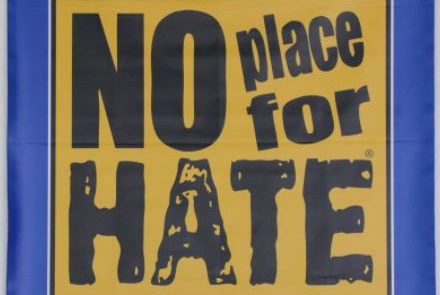Why It Is Not Just a Word

Photographer: Conte, Christian
May 8, 2021
“It’s just a word.”
This is a phrase that many people use as an excuse for saying things that are racist, homophobic, or ableist. Slurs have been used to abuse and degrade people for, in some cases, centuries. Years and years of hate surround these words, yet some still use them in their speech. These slurs have no place in modern society, and we as a school community must understand and accept this if we want to move on from the hate and bigotry this language reflects.
What classifies something as a slur? The reason a word can be called a slur is that it has a deep history of abuse and prejudice behind it. Curse words are not slurs, and slurs shouldn’t be classified as curse words. Curse words may be offensive, but slurs are about power and control.
The n-word, for example, has been in use for centuries. Its first usage can be traced to the transatlantic slave trade that brought Africans to the Americas by force. The slave traders and owners would refer to enslaved people using the n-slur to dehumanize them and justify treating them like animals to be used for labor, and white supremacy remains the source of its longevity today. During the civil rights movement in the 1960s, white supremacists would use this slur to put down Black individuals. Today, you can hear white supremacists screaming the slur at Black people on the street or in white supremacist demonstrations like the deadly one in Charlottesville, Va., in 2017.
The f-slur is another example of a hateful word that is still in use today. In its original meaning, the word referred to a cigar or a bundle of sticks used for burning; however, it later became a homophobic term used to degrade gay men. The reason: its association with the way people were burned to death in the past as punishment for heresy, and it is impossible to disassociate the word from acts of oppressive violence.
Finally, a more recent example of a once commonly-used word that has shifted into derogatory territory is the r-slur. The word comes from the musical term “ritardando,” which means “slower.” In the 1960s, it was used as the official medical term for those with intellectual disabilities. Over time, people began to use it pejoratively. In 2010, President Obama signed Rosa’s Law, which changed the official language from the r-slur to “intellectual disability.” Many people do not realize that the original word is no longer used by medical professionals, and every instance of its use today is degrading to the 200+ million people in the world who have an intellectual disability.
Curse words are not slurs, and slurs shouldn’t be classified as curse words. Curse words may be offensive, but slurs are about power and control.
Another thing about the way language adapts over time that people from majority groups sometimes struggle with is when members of marginalized groups reclaim hurtful words. Why is it that people from some groups can use a particular term but not others? To reclaim an oppressive term or phrase is an act of resistance by the community it demeans. It allows them to take a word that degraded them and make it one of unity and celebration. The word “queer,” a derogatory term first directed at the LGBTQ+ community during the 19th century, has now become a celebratory term among many LGBTQ+ people. Similarly, some Black people use the n-word amongst themselves, and they have the social authority to do so because they have endured centuries of mistreatment and oppression simply because of the color of their skin. Those members of the Black community have taken this word back and used it as a unifying term. Yet even then, it should only be used in-group and in casual conversation, not in a professional or educational setting, including at Marist.
Some white people think the word “cracker,” a derogatory term used to describe whites, is just as much a slur as the n-word. However, this is not the case. While “cracker” might be offensive to some, it is not a slur. Why? Because you can’t oppress the oppressor. “Cracker” emerged among people of color as a reaction to the bigotry they faced. White people have never faced this type of bigotry solely because of their race.
If you hear or experience someone saying one of these slurs derogatively to oppress or insult someone, please step in. Explain why it’s wrong and ask them if they know the history of the word. Stopping and educating people about these words is the only way to move forward as a community and as a better, more informed society. For more information on Marist’s specific policies regarding the use of slurs, consult the parent/student handbook. You may also check out the school’s statement on inclusion and diversity at www.marist.com/school-life/inclusion–diversity.


